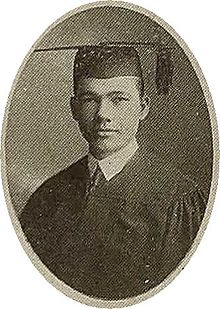Benjamin D. Wood
| Ben D. Wood | |
|---|---|

1917 Columbia University graduation portrait
|
|
| Born |
Benjamin DeKalbe Wood November 10, 1894 Brownsville, Texas, U.S. |
| Died | July 1, 1986 (aged 91) Westchester, New York |
| Nationality | American |
| Other names | Ben D. Wood, Dr. Wood |
| Education | Brownsville Area Schools |
| Occupation | Psychologist and educator |
| Employer | Teachers College, Columbia University |
| Known for | Father of modern educational psychology |
| Spouse(s) | Grace T. Wood |
| Signature | |
Benjamin DeKalbe Wood (November 10, 1894 – July 6, 1986) was an American educator, researcher, and director / professor at Columbia University. He was a pioneer in learning technologies and automated testing methods. Wood is the creator of the multiple choice test, which was the state-of-the-art way of measuring a teacher's understanding of certain subjects that in the long run influenced their salaries. He helped in the design of the multiple choice form of the pencil-in bubbles used in the 20th-century and the scoring machine that automatically read these forms, saving many hours in manual clerk labor. His concepts of intelligence tests were expanded to the accounting fields.
Wood was born in Brownsville, Texas, on November 10, 1894. He had six brothers and five sisters. His father was Alexander Wood and his mother Harriot Wood. His parents moved the family from Central Texas to the Valley in 1896. Wood attended the Brownsville area schools and graduated from Mission High School. At 17, he went to school for an additional semester at Brownsville High School so he could qualify for a college entrance exam for the University of Texas, which normally then had an age requirement of 18.
Wood attended University of Texas and graduated in 1917 with a B.A in psychology. Wood then attended Columbia University in 1918 and graduated in 1922 with a M.A. degree, and in 1923 received from there a doctor of philosophy degree. At Columbia he became an assistant to Dr. E. L. Thorndike in 1919. In 1921 he became an instructor and an assistant to the university dean. He was promoted to full professorship of collegiate education research in 1938. Wood became head of Columbia's collegiate research bureau in 1927. He became an expert in the educational field and it was his career for some 33 years.
Wood's philosophy was to make education responsive to the students. As director and professor emeritus his contention was that teachers spent too much time pressuring the students to take exactly the prescribed information given in the curriculum courses. The prescribed courses were directed by the managers of the higher education system that had their own interest in mind, rather than the student's interest of being able to learn on their own. Wood's philosophy was to get the student to think creatively, rather than memorize bits and pieces that would be lost shortly thereafter. The students always depended on the teacher for the answer, rather than finding the answer themselves. He argued and pointed out that schools were just turning out intellectual zombies. He alleged the concept of thoughtful curiosity was being withheld from students. He understood that certain basics were necessary, but even then should be taught to the student with logic and reasoning behind the principle. He was for teaching reform and to do away with the teaching methods then in place.
...
Wikipedia
